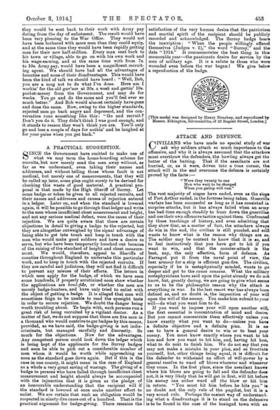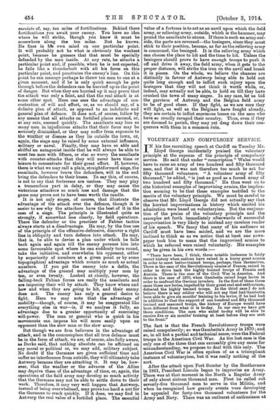ATTACK AND DEFENCE.
CPiTILIANS who have made no special study of war ask why soldiers attach so much importance to the offensive, and why it is always assumed that the attackers must overthrow the defenders, the bowling always get the better of the batting. That if the assailants are not hurried, or, as it were, driven into a time corner, the attack will in the end overcome the defence is certainly proved by the facts :— " Were they twenty to one Men who wait to be charged
When you gallop will run."
The vast majority of sieges have ended, even as the siege of Port Arthur ended, in the fortress being taken. Guerrilla warfare has been successful as long as it has consisted in surprise attacks, but it has always failed when an army has had time enough steadily to hunt down the guerrillas and use their own offensive tactics against them. Confronted by these teachings of history, and even admitting that they show that, as a matter of fact, the attackers always do win in the end, the civilian is still puzzled, and still wants to know what is the reason why things are so. The soldier may be content to know that it is so, and to feel instinctively that you have got to hit if you want to win, and that the counter-attack is the best, nay, the only effective, form of defence. AS Farragut put it from the naval point of view, the best armour for a ship is efficient gun-fire. The civilian, especially if he is metaphysically minded, wants to go deeper and get to the causes causans. What the military metaphysicians have said upon the point already we do not know, but, greatly daring, we are going to give what seems to us to be the philosophic reason why the attack is everything in war. In the last resort war has always been defined as, and no doubt is, the imposition of your will upon the will of the enemy. You make him submit to your will—do what you want him to do.
If you want to impose your will upon another will, the first essential is concentration of mind and desire. But you cannot concentrate them effectively unless you know exactly what you want to do—unless you have
a definite objective and a definite plan. It is no use to have a general desire to win or to beat your
enemy. You must know exactly where you want to hit him and how you want to hit him, and, having hit him, what to do next to finish him. We do not say that you may not make a mistake in your plan, and so frustrate yourself, but, other things being equal, it is difficult for the defender to withstand an effort of will-power by a general resolve to ward off blows wherever and whenever they come. In the first place, since the assailant knows where his blows are going to fall and the defender does
not, it is very likely that he will get in first, will hit before his enemy can either ward off the blow or hit him
in return. "You must hit him before he hits you" is
no doubt not the only rule of the pugilist, but it is a. very sound rule. Perhaps the easiest way of understand-
ing what a disadvantage it is to stand on the defensive is to be found in the case of the besieged town with an
enceinte of, say, ten miles of fortifications. Behind these fortifications you await your enemy. You have no idea where he will strike, though you know it must be somewhere along the ten miles. But be knows. He fixes in his own mind on one particular point. It will probably not be what is obviously the weakest point, because he guesses that that must be specially defended by the man inside. At any rate, he attacks a particular point and, if possible, when he is not expected, ho falls like a thunderbolt with all his force on this particular point, and penetrates the enemy's line. On this point he can manage perhaps to throw ten men to one at a given moment, and if he is only quick enough he gets through before the defenders can be hurried up to the point of danger. But when they are hurried up it may prove that the attack was only a feint, and that the real attack is at some other spot. Here one sees the advantage of con- centration of will and effort, or, as we should say, of a definite plan of attack, as opposed to an indefinite and general plan of defence. It does not, of course, follow by any means that all attacks on fortified places succeed, or, at any rate, succeed quickly. The assailants may lose so many men in injudicious attacks that their force may be seriously diminished, or they may suffer from exposure to the weather or disease as they lie outside the town, or, again, the siege may be raised by some external influence, military or naval. Finally, they may have so able and skilful an antagonist inside that he will always be able to meet ten men with fifteen, or else so worry the assailants with counter-attacks that they will never have time or leisure to concentrate for their great effort. If, however, there is what we may call a plain, straightforward siege, the assailants, however brave the defenders, will in the end bring the defenders to their knees. To say this, of course, is not to say that fortresses are useless. They may play a tremendous part in delay, or they may cause the victorious attackers so much loss and damage that the game may prove not to have been worth the candle.
It is not only sieges, of course, that illustrate the advantage of the attack over the defence, though it is easier to see why the attackers have the best of it in the case of a siege. The principle is illustrated quite as strongly, if somewhat less clearly, by field operations. There the defender or the practicer of Fabian tactics always starts at a disadvantage. He may, by the free use of the principle of the offensive-defensive, discover a right line in obliquity and turn defence into attack. He may, that is, be able to devise a plan under which be falls back again and again till the enemy pursues him into some favourable spot where he can suddenly turn round, take the initiative, and overwhelm his opponent, either by superiority of numbers at a given point or by some topographical advantage which counts as much as actual numbers. If you get the enemy into a defile, the advantage of the ground may multiply your men by ten, or even twenty. Looked at closely, however, the falling-back Fabian forces are really the assailants and are imposing their will by attack. They know where and how and when they are going to hit, and their enemy does not. The enemy has only a general desire to fight. Here we may note that the advantage of mobility—though, of course, it may be exaggerated like everything else in war—is, if we analyse it fully, an advantage due to a greater opportunity of exercising will-power. The man or general who is quick in his movements can impose his will more easily upon an opponent than the slow man or the slow army.
But though we are firm believers in the advantage of attack, and in the commonplace that all true defence must be in the form of attack, we are, of course, also fully aware, as Burke said, that nothing absolute can be affirmed on any moral or political or, we may add, military subject. No doubt if the Germans are given sufficient time and suffer no interference from outside, they will ultimately take Antwerp because they are attacking it. It may be, how- ever, that the weather or the advance of the Allies may deprive them of the advantage of time, or, again, the operations of the field army may develop so much activity that the Germans may not be able to settle down to their work. Therefore, it may very well happen that Antwerp, instead of being overwhelmed, may prove too hard a not for the Germans to crack quickly. If it does, we may find in Antwerp the real value of a fortified place. The essential value of a fortress is to act as an anvil upon which the field army, or relieving army, outside, which is the hammer, may pound the assailants to atoms. If there is such an army out- side, the parts are reversed—the besiegers, since they must stick to their position, become, as far as the relieving army is concerned, the besieged. It is the relieving army which can choose the place to hit and the time to hit. Unless the besiegers should prove to have enough troops to push it off and drive it away, the field army, when it gets to the proper distance, will strike the iron on the anvil and break it in pieces. On the whole, we believe the chances are distinctly in favour of Antwerp being able to hold out quite long enough and to inflict such injury upon the besiegers that they will not think it worth while, or, indeed, may actually not be able, to hold on till they have crushed the town of many sieges. In any case, let us bid the garrison of Antwerp and the Belgian field army to be of good cheer. If they fight, as we are sure they will fight, as well as the Belgians have fought already, they are certain to inflict enormous losses on the men who have so cruelly ravaged their country. Thus, even if they are doomed to perish, they may yet drag down their con- querors with them in a common ruin.











































 Previous page
Previous page